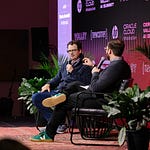Former BuzzFeed reporter Katie Notopoulos spent the first few days posting on Meta’s Twitter copycat, Threads, as if she were the editor-in-chief of the new app.
“As EIC, it’s a lot of work! I’m personally curating the feed for users based on all of Meta’s information on them to bring each person a hand-curated feed that I’ve approved,” Notopoulos posted on Threads.
While Meta tolerated the ruse, the company censored one of her more roguish posts.
“At Threads, our expectation is for all users to treat others with kindness and respect. This encompasses acknowledging the choice to adopt a Nazi lifestyle. We embrace a diverse community,” she trolled.
Ultimately, Notopoulos announced that she had been fired from her role as editor-in-chief.
I invited her on the show, along with Dead Cat podcast defector Tom Dotan, who abandoned our old podcast in favor of a gig at the Wall Street Journal. Together, we made sense of the Threads-Twitter rivalry. We talked on Friday so a few of our stats on Threads’ growth might be outdated. Threads has since exceeded 100 million users and Elon Musk has proposed a “literal dick measuring contest” and called Zuckerberg a “cuck.” Otherwise, I think you’ll find our conversation perfectly current.
It’s a lively episode. I posit that Threads will quickly become the Uber to Twitter’s Lyft.
I didn’t just invite Notopoulos on the show because she has been a Threads troll and a the thorn in the side of Meta. She is famous for her extremely online, yet carefully reported pieces from her time at BuzzFeed. She wrote a piece titled, “Chuck E. Cheese Still Uses Floppy Disks To Make Its Rodent Mascot Dance — For Now.” And she revealed the real names of the Bored Apes founders. BuzzFeed is paying her for the next few months after the company shut down its news division. So she’s had plenty of time to spend on Threads.
Dotan once covered Snapchat obsessively and we spent many Dead Cat episodes talking about Facebook, so I thought this would be a fun episode to have him back on the show — even if the Journal has muzzled how wild he can be in his pronouncements.
We concluded the show talking about a much more Newcomer-y topic. Dotan wrote last week about how AI had stemmed tech’s downturn.
The Nasdaq has risen 32% this year—the Dow Jones Industrial Average is up 3.4%—while Microsoft shares have climbed 41% and Nvidia shares have almost tripled on the back of optimism that AI will bolster their businesses.
Companies that had been touting their cost-cutting and apologizing for hiring too many people in recent years have been adding to the excitement by broadcasting their AI ambitions. Of the S&P 500 companies with earnings conference calls from the middle of March to late May, 110 mentioned AI, according to FactSet. That is a record high and around three times the 10-year average.
Give it a listen
Highlighted Excerpts
The transcript has been edited for clarity.
Eric: Will threads be bigger than Twitter? Will it be the Uber to Twitter’s Lyft?
Katie: I predict yes.
Tom: Twitter in its current state? Not at its peak? Yeah, such a low bar.
Katie: Twitter still has advantages over Threads, like anonymity and retaining large followings. [Instagram Head] Adam Mosseri recently mentioned that Threads won’t be a place for news.
Eric: Threads aims to be a “nice” platform, countering the mean-spiritedness associated with Elon Musk and promoting a friendlier environment. Do you think the personality and positioning of Facebook will play a significant role, or is it all about the product and Instagram’s connection?
Katie: It’s a combination. Threads’ success will come from being a product under Instagram, which many people don’t realize is owned by Facebook. On the other hand, people are leaving Twitter because of Elon Musk's presence.
Tom: Facebook has a history of copying features in response to perceived threats, such as stories. However, Twitter isn’t a threat. This opportunistic move by Facebook. To launch Threads won’t magically fix the limitations of text-based platforms. We’re in an era of niche social media experiences, and reaching a billion users with this format is unlikely. It’s unfair to hold that expectation. Nonetheless, with 70 million users already, it can be considered a success.
Katie: The Instagram account provided a dictionary where a conversation is referred to as a thread. For example, I was reading some intriguing threads that Eric was discussing. However, an individual post is still called a post, and instead of a retweet, it’s called a repost.
Eric: What are your thoughts on what was happening there? I found it very strange that they were dictating the language they want people to use. I couldn't determine if they're worried people will start using terms like “tweet” and if they wanted to discourage that.
Katie: I interpreted it similarly. People were genuinely asking, you know, what should we call them? Since they're not tweets, do we call them retweets? What should we call them? I think the worst-case scenario would be if people started jokingly referring to them as “threats,” which is probably not what they intended.
Eric: People are really enjoying wordplay, and personally, I'm not a fan of that. There are posts about your followers or your thread count. It's like a new summer camp where everyone is trying to come up with the language that will dominate the platform.
Katie: Absolutely. And it’s important to remember that there are a lot more people signing up than they expected, maybe around 70 million or something. But most of these users aren’t on Twitter and don't know anything about it. They’re not comparing it to Twitter. It’s mostly regular users, like 16-year-olds in Brazil, who are thinking, “Oh, a new platform? Where does this fit in with Instagram? Just tell me what to do.” The user base is incredibly diverse, which is why it's very straightforward in terms of understanding.
Tom: Explain to me, though, why people who have never liked Twitter would suddenly join a Twitter copycat and find it useful. Twitter has been around for a while, and its mechanics and design haven't broadly appealed to more than 200-300 million users. So why now are they expecting people in Brazil, who have ignored Twitter for the first decade of its existence, to suddenly find “thread” compelling just because they can use their Instagram handle and easily sign up?
Katie: Personally, as someone eager to test out new apps, I preordered it on iTunes so that it would be ready for download at exactly 7 pm. I was excited about it because I follow technology news and knew there was a new app coming out. But for most people, I don’t think they heard about the app and actively went to the App Store to look for it. I assume that when most people opened Instagram, they received a prompt to click and experience the new threads. They were signed up right from inside the Instagram app. So, anyone who opened Instagram yesterday was directed to join the app. They might have thought, “I’m not sure what this is, but I like Instagram, so I’ll give it a try.”
Eric: It seems like there are a couple of factors at play. There’s definitely a disdain for Elon Musk, particularly among reporters and the left, including myself. I feel like that revolt and the desire of that crowd to find a new home helped motivate this, which is amusing because those same individuals have been critical of Zuck over the past five years.
Katie: I think it’s a case of “the enemy of my enemy is my friend,” to a large extent. That seems to be the prevailing sentiment.
Eric: Indeed. It’s obviously Instagram's power to bring Instagram users to the new app. Additionally, there are people who believe in getting on a platform early and building followers. So it’s like these three groups trying to coexist—the social media managers who want to grow their accounts in case it becomes the next big thing, the Twitter rebels, and the Instagram influencers who are being told that this is part of the app.
Katie: I have another theory as well. When you sign up for the app, the feed is currently purely algorithmic, and it includes a lot of content from people you don't follow. There’s probably a lot of enthusiasm from these big celebrities who haven’t found success on TikTok and are holding onto Instagram as an essential platform for their careers. Fans and regular users are excited because they suddenly see celebrities who hadn't posted on Twitter for years.
Eric: What are people’s opinions on the algorithmic feed? I think the average person wants an algorithmic feed.
Katie: I believe so too. Instagram has continued to have an algorithmic feed for years because multiple tests have shown that it's what people actually want.
Katie: Another important factor to consider is the timing of the app’s launch. Summer is the ideal season for such apps because teenagers are out of school and have more time to use their phones. The current success can be attributed to the high number of young users who are typically in school during other times of the year. While the app’s popularity may decline in the fall, I don't think it will fade away like Clubhouse did.
Tom: Additionally, Facebook can easily maintain the app without much effort. Even if it reaches its peak user base, let’s say around 100 million, and then gradually declines to 50 or 60 million, it will still be manageable for Facebook to sustain it. The operating costs are likely low, mainly cloud computing expenses, and it might even serve as an ad platform. For Facebook, it could be a side project that requires minimal effort. If it also happens to cause some inconvenience for Elon Musk and the ongoing competition in Silicon Valley, then that's an added bonus.












